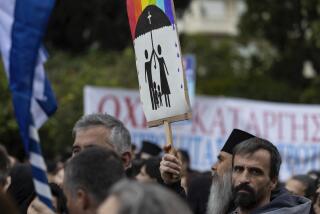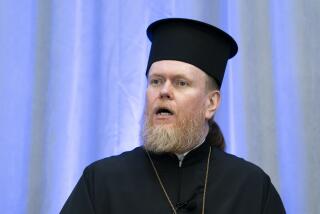Conservatives, Liberals in U.S. Hail Religious Changes in Soviet Union : Reforms: There has been surprising optimistic unanimity on Gorbachev’s policies. But experts point out that he still has a long way to go.
- Share via
Was Soviet leader Mikhail S. Gorbachev sincere when he joined hands with Pope John Paul II on Dec. 1 and pledged to continue to lead his country down the path of religious reform?
And are the religious reforms burgeoning under Gorbachev’s policies of glasnost and perestroika more than a passing phenomenon?
On both counts, conservative and liberal monitors of religion in the Soviet Union are answering “yes,” displaying a surprising degree of unanimity on questions of politics and religion which, under most circumstances, could be expected to spark strong disagreement.
In both camps, Gorbachev and his reforms appear to be scoring high points, even though much of the praise is qualified by observations that religious reform in the Soviet Union is still in its infancy.
In interviews conducted during the days following Gorbachev’s historic meeting with the Pope, those sentiments were voiced by representatives of religious organizations well known for their staunch opposition to communism, by officials of the liberal National Council of Churches and by a rabbi who heads an interfaith organization founded to promote religious freedom around the world.
Kent Hill, director of the Institute on Religion and Democracy, a Washington-based organization noted for its relentless critique of communism, warns that new religious openings in the Soviet Union may overshadow what he believes is continued persecution of believers in some quarters.
Despite those misgivings--and recent events that appear to support them--Hill said in an interview that he believes Gorbachev is sincere in promising to continue charting a route to religious reform. He said the Soviet leader appears to be calling for reform not simply to curry favor with the West but because he really believes it is “not necessary” to cultivate “anti-religious attitudes.”
The author of “The Puzzle of the Soviet Church” (Multnomah Press), Hill said he believes long-promised changes in the Soviet laws on religion will ultimately come about.
Those views are shared in large measure by the Rev. Robert Hawley, another inveterate critic of communism who heads Open Doors-U.S.A., a nondenominational, California-based group that distributes Christian literature in restricted countries, including the Soviet Union.
“Gorbachev has finally allowed people to express their faith without fear of repercussions,” said Hawley. “For the first time in communist history, they (communist leaders) have acknowledged and recognized the church as a viable institution in their society.”
The reforms have gone so far already--and seem to have such support--that it is unlikely there could be any significant rollback, Hawley said.
Gorbachev’s policies have led to the reopening of hundreds of closed houses of worship and unprecedented distribution of religious literature under communist rule.
In one of the most remarkable turnabouts, Soviet officials in the Ukraine announced during the Rome meeting between the Pope and Gorbachev that they would begin registering congregations of the Ukrainian Catholic Church, which in 1946 was forced to merge with the officially recognized Russian Orthodox Church.
Father Leonid Kishkovsky, the newly elected president of the National Council of Churches and the first Orthodox Church person to hold that post, said the Soviet reforms reflect “a readiness of the society . . . to see the positive contributions of religious life for the moral strength of society, and all of that is for the good.”
Kishkovsky, whose paternal grandfather was an Orthodox priest in what is now Poland, characterized Gorbachev’s sincerity as a recognition that it “makes sense for him to appeal to all the positive forces in his society.”
The Soviet Union is so far down the road to reform, Kishkovsky said, that it will be “impossible to roll things back to the ideological rigidity” that characterized the Soviet approach to religion historically.
Like other observers, Kishkovsky said he anxiously awaits the new law on religion that Gorbachev has promised will codify many of the administrative reforms already taking place.
Kishkovsky said he saw one of several drafts of the new law during a recent Moscow trip. He called the draft a “distinct improvement” over current laws which, among other things, limit the ability of parents to provide religious education for their children and deter the spreading of religious faith openly.
For Rabbi Arthur Schneier, president of the Appeal of Conscience Foundation, an interfaith religious rights organization, reforms under way in the Soviet Union represent a dream long shared by him and his colleagues.
“Basically, Gorbachev needs allies for the restructuring of Soviet society,” he said. “Certainly, with the communist ideology falling apart, the religious community can be a very important harnessing point for a people who are searching for an anchor of faith, . . . a way to cope with all the changes that are being introduced.”
Speaking of the possibilities of a “renewed identity” for all believers in the Soviet Union, Schneier said, “I’m grateful to God that I lived to see it.”
More to Read
Sign up for Essential California
The most important California stories and recommendations in your inbox every morning.
You may occasionally receive promotional content from the Los Angeles Times.













